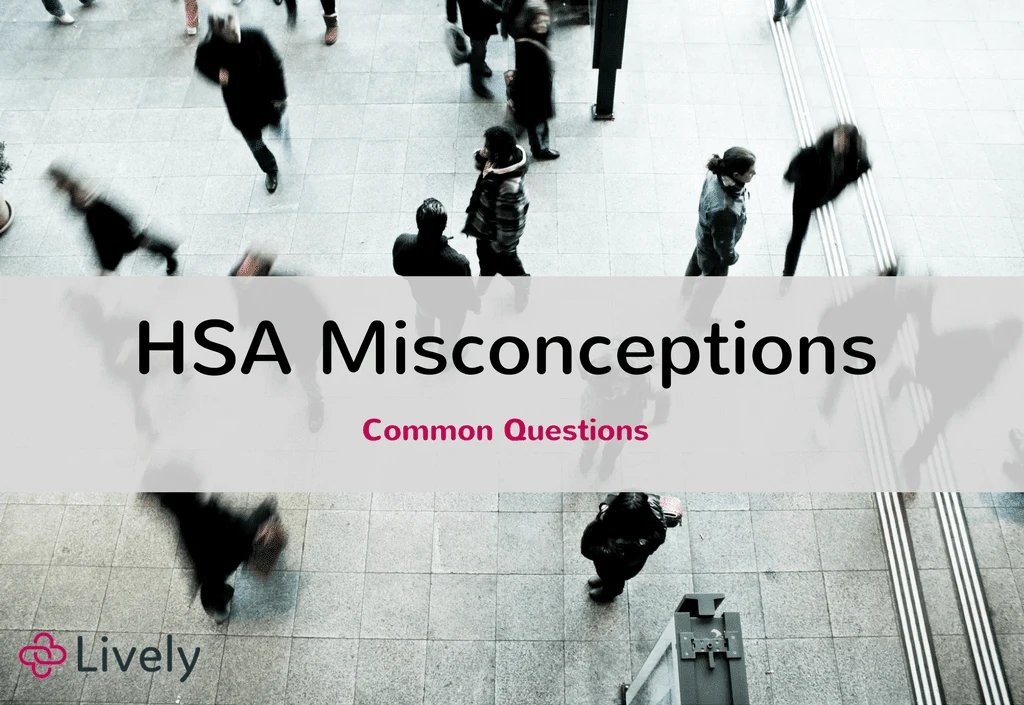The Lively Blog
SIGN UP FOR OUR
Newsletter
Stay up to date on the latest news delivered straight to your inbox
Common HSA Misconceptions
Lively · August 1, 2017 · 4 min read

HSAs aren’t new, but for many of us, they remain elusive. Let us help you get more educated and answer all of the common HSA questions.
HSA Misconceptions
Misconceptions #1: An HSA is the same as an FSA
HSA and FSA share a similar acronym, but most of their commonality ends there. While both are health accounts and vehicles for health savings, they have very unique parameters.
An HSA or Health Savings Account is a personal savings account for health expenses. HSAs are owned by individuals (not employers) and can be transferred from job to job or institution to institution, similar to a 401k or IRA. Contributions are 100% tax deductible (until you reach the federal limit) and HSAs have triple tax advantages (tax-deductible contributions, tax-free interest and tax-free withdrawals for medical expenses). HSAs can be used in conjunction with all qualifying high-deductible healthcare plans (HDHP) in the US.
An FSA or Flexible Spending Account is a pre-tax health account that can be used to pay for eligible healthcare expenses. An FSA is provided by employers and gives eligible employees a tax-free account to save money for expected qualifying health expenses that are part of that plan year. An FSA is a great way to save pre-tax dollars for expected medical expenses for the current year.
Most importantly, unlike an FSA, HSAs have no “Use it or Lose It” provision. You can add money today and use it for years to come. Individuals own their HSA account and can take it with them if they leave your current employer and roll it over into a new account just like a 401k. Most importantly, you can create long-term savings account to pay for any health expenses throughout your life.
Misconception #2: HSA Increase My Health Costs
An HSA is not your healthcare plan but can be used in conjunction with qualifying healthcare plans to save money. You get to choose the contribution amounts. While it would impact your monthly savings, check out these scenarios, to better understand the costs to your long term wealth. In many cases, adding an HSA and it’s triple tax advantages will save you money over the long term. We should also note, a Lively HSA is free for individuals. That’s right, no hidden fees or costs.
Misconception #3: I Don’t Qualify
To qualify for any HSA (regardless of income or health), you simply need a qualifying HDHP. Under 2017 federal regulations, HDHPs that qualify must have deductibles of $1,300 or more for an individual and $2,600 for a family. If your employer does not offer an HSA as part of your high deductible health plan, you can sign up as an individual (or family) and contribute.
Misconception #4: They are Only for Healthy People
There is no question, HSAs are a great option for healthy young individuals to save for future health costs. They are willing to have higher deductibles in exchange for increased health savings. But why does it have to be an either/or? However, for individuals or families with higher expected (or unexpected) out-of-pocket healthcare costs, HSAs provide a way to save tax-free dollars for your expenses. It’s like a 25%* discount off the sticker price.
*Assumes 25% state and federal income taxes for individuals or families
Misconception #5: I am Too Old to Get Started
This couldn’t be farther from the truth. Why? HSAs are a great vehicle to save tax-free dollars for retirement. In addition to saving health money for retirement, after 65 years of age, you can use your health savings account (HSA) money non-health related expenses. It’s just another interest-bearing account similar to your 401k or IRA.
Current health costs for retirement are between $250,000 (individual) and $350,000 (couple). This is in addition to expected Medicare coverage. An HSA will help you get ready for those expected long term health expenses.
If you need more help with HSA decisions, check out our blog. We will make you a healthcare benefits expert in no time, without any extra work or effort on your end.

Benefits
2025 and 2026 Maximum HSA Contribution Limits
Lively · June 20, 2025 · 3 min read
On May 1, 2025, the IRS announced the HSA contribution limits for 2026: $4,400 for individual coverage and $8,750 for family coverage. That’s a $100–$200 increase from the 2025 limits, which are $4,300 and $8,550 respectively. If you’re 55 or older, you can still contribute an extra $1,000.

Benefits
What is the Difference Between a Flexible Spending Account and a Health Savings Account?
Lauren Hargrave · February 9, 2024 · 12 min read
A Health Savings Account (HSA) and Healthcare Flexible Spending Account (FSA) provide up to 30% savings on out-of-pocket healthcare expenses. That’s good news. Except you can’t contribute to an HSA and Healthcare FSA at the same time. So what if your employer offers both benefits? How do you choose which account type is best for you? Let’s explore the advantages of each to help you decide which wins in HSA vs FSA.

Health Savings Accounts
Ways Health Savings Account Matching Benefits Employers
Lauren Hargrave · October 13, 2023 · 7 min read
Employers need employees to adopt and engage with their benefits and one way to encourage employees to adopt and contribute to (i.e. engage with) an HSA, is for employers to match employees’ contributions.
SIGN UP FOR OUR
Newsletter
Stay up to date on the latest news delivered straight to your inbox
